To run the forums, host the website, and travel, I charge a universal service fee for my reviews. This in-depth review was sponsored by Rad Power Bikes. My goal is to be transparent and unbiased with you, this video and writeup are not meant to be an endorsement of RPB products. I welcome your corrections, additions, and feedback in the comments below and the Rad Power Bikes electric bike forums.
Observations:
- Starting in 2020, customers in some major cities can pay $149 to have the Rad Mobile Service van deliver, assemble, and provide maintenance support for their bikes. Rad is also offering demo rides and post-purchase service, including warranty work with their vans. I got to see one in person while visiting Austin Texas USA, and I came away feeling impressed. Rad is blending their online presence with a local shop feel which elevates customer service and support
- This is the first generation RadRhino Step-Thru, but it’s based on the 5th generation North American RadRover product. You get the same motor, battery pack, and drivetrain hardware as the European RadRunner model… with a slightly heavier black or white frame. It’s more approachable than the full sized RadRhino, and the bottle cage mounting position is much more reachable, but the frame isn’t as stiff and more weight is shifted towards the rear of the frame due to the vertical battery mount. In my opinion, all of the kinks have been worked out, but some of the hardware components are decidedly mid-tier to keep the price down… those include the non-locking grips, square tapered spindle, spring suspension fork with 9mm quick release vs. thru-axle, Shimano Acera derailleur, and freewheel vs. cassette.
- Rad Power Bikes introduced a new metallic head tube badge, refined twist-assist interface, and an updated headlight with focused light beam in the center and surrounding LED light ring that looks really cool
- The twist power assist feature allows riders to instantly engage walk mode if the bike is not being pedaled (which can also be activated by holding the down arrow on the display, when the bike is turned on), or boost any of the lower assist levels up to power level 5 without having to press any buttons… basically, it’s like a quick jump from assist 1-4 up to 5, and you must continue pedaling for it to work. Since throttles are not allowed in most European countries, Rad created this unique interface to comply with legislation while still offering riders a way to quickly engage with the bike, which I found to be very satisfying!
Pros:
- This is one of the only step-thru fat tire electric bikes I’ve seen, and it’s done really well. This bike will be easier to mount and stand over when compared to the tradition RadRhino, but the frame weighs more and isn’t as stiff. Rad Power Bikes custom engineers their frames and puts a lot of attention into the details of which components are used… even going so far as to co-brand them with parter companies like King-Meter for the LCD display, Bafang for the hub motor, and Kenda for the tires
- I love that the bike comes in two colors, black and white. The lighter color will show up better in the early morning or evening, but you’ve still got big reflective stripes on the tires and integrated lights, so the bikes are very visible and safe in that regard. Also, Rad Power Bikes added a darker accent stripe on top of the main tube, so it won’t show smudges and dirt as much if you kick the frame when mounting or dismounting
- Note the longer seat post binder lever that Rad uses, it’s much easier to release and tighten without straining fingers compared to a traditional shorter binder… though it does add a little extra weight, this is a great example of how Rad scrutinizes the little details of their products to make them more enjoyable
- Rad Power Bikes really nails it with the integrated lights because they run off of the main battery, have quick disconnect points for easy replacement if damaged, and the rear light has a blinking and bright braking mode! They’re far ahead of other similar priced products… even some higher priced ebikes I’ve reviewed recently
- Excellent headlight design here, it uses a bright 80 lumen center beam to help you see where you’re going, as well as a surrounding LED light ring to help you be seen. The light ring is visible from many angles, including the side. The housing for the headlight features an aluminum alloy heat sink on top to improve cooling! At first, I thought that it was just for show, but it’s actually metal and connects to the internal LED housing. Note that the rear light is also visible from the sides, even if you add a rack, because of how it was designed… nice work there
- Rad Power Bikes worked closely with Kenda to offer reflective stripes and puncture protection on all of their tires. That’s really nice because changing a flat on an ebike can be a lot of work… especially if it uses a hub motor without quick release (as all Rad models currently do). The front wheel does have quick release, but usually flats occur on the rear tire. Keep the tire pressure within the recommended range to reduce the potential for flats
- Overall, this ebike is very comfortable and capable. I’ve tested them in soft sand and mud during a trip to Mexico, after lowering the pressure to ~5 PSI, and they worked great! The shorter stem and mid-rise handlebar don’t require riders to reach or lean so far forward, which I find to be more comfortable. The spring suspension fork offers enough travel and adjustment to reduce wrist, arm, shoulder, and back pain, and the bike gets even more comfortable if you purchase the optional suspension seat post
- By default, the RadRhino models come with durable plastic fenders. They’re wide enough to keep you dry (as I tested in the video review above), and they are lightweight and durable… without producing a lot of noise. I really appreciate that the company designed a rear light riser, to help boost it up above the rear fender! Furthermore, if you purchase the optional rear rack, there’s an extender cable so the light fits further back. It’s protected by the rack tubing but isn’t blocked from the sides… excellent placement
- The seat tube has been custom designed to interface with a battery pack, notice the flattened portion where the slide mounts. Rad uses three bolts for their battery mount vs. just two on many cheaper ebike products I’ve seen over the years, which is reassuring if you plan to ride off-road
- Matching faux-leather ergonomic grips and saddle look great and provide good comfort. I’ve tested a bunch of seats, and this one is soft enough, but not so wide that it will chaff your inner thighs when pedaling. It also has a handle built into the back for easier lifting of the bike
- I appreciate that Rad Power Bikes is using the same battery pack for all of their models now. This means you can purchase a few bikes and easily swap the pack around, or take two packs along for an extended adventure. The battery itself uses high-quality lithium-ion cells from Samsung, is warrantied for a year, and is cheaper to replace because it doesn’t contain the ebike controller (that’s built into a little box, mounted behind the seat tube on this bike)
- You can charge the battery pack on or off the frame, and it has three key positions for unlocked, locked to frame powered off, and locked to frame powered on. This helps deter tampering with the bike without having to take the battery pack off at every stop. For best results, store the battery in a cool, dry location. Extreme heat can damage the cells and extreme cold will stunt them and limit your range temporarily
- Even though the battery and controller box are mounted externally, this is still a purpose-built electric bike with a sturdier frame design and internally routed cables and wires. Note the stainless steel torque arm on the left rear dropout that adds frame strength! This will keep the motor axle from chewing into the softer aluminum alloy frame over time
- The planetary geared hub motor offers great power for starting, navigating soft terrain, and climbing. Rad has optimized it to feel smooth and steady vs. zippy and abrupt. It’s fairly capable at 250 watts, which I believe is the European nominal power limit (EN15194 250). I’m not sure how much torque it offers, but the North America version offers 80 newton meters, which is also at the higher end of the spectrum. Geared motors like this freewheel without introducing magnetic drag
- I think the standard free shipping is a great option, and Rad Power Bikes has updated their box to include some fun artistic graphics. Note the plastic handles built into the sides of the cardboard box for easy lifting and dragging (I suggest asking a friend to help you move the box safely, because these are heavy machines)
- It’s awesome that Rad Power Bikes has expanded to include more countries in Europe in recent years (Netherlands, Germany, France, Belgium, and United Kingdom at the time of this review). They’ve even setup a headquarters office in Utrecht, the Netherlands. It’s my understanding that they offer free shipping and are building out a team of mobile delivery vans to help with test rides, product assembly, and support for some major metropolitan areas
- I like the sturdy Wellgo platform pedals, aluminum alloy chain guide, neoprene slap guard, and steel derailleur guard on this electric bike because it means you won’t slip off as easily, won’t have the chain bouncing off, won’t chip the frame, and can keep the sensitive shifter parts and motor power cable from getting bent or snagged if the bike tips, is parked at a crowded rack, or gets tossed around in shipping
- In addition to the standard fender, rear rack, and bottle cage mount, this bike offers sturdy front rack mounts. These mounting points are very sturdy, especially the front mount, and Rad sells a bunch of accessories that all work well together on this and other models. There are trays and baskets that work in both the front and rear, insulated bags, waterproof panniers, a child seat from Yepp!, and a phone mount
- I love that the LCD display panel is fairly large, has adjustable backlight brightness, and a full size USB port built into the bottom. This is very convenient if you are using the optional phone mount for GPS and need a bit of extra juice for your phone on long rides
- For me, the three-button control pad, that’s mounted near the left grip, is easy to reach and simple to use. You press up or down to raise and lower assist, you press mode to cycle the odometer and trip meter, you hold up to cycle current speed, average speed, and max speed, and you hold up and mode simultaneously to activate the lights, finally you hold down to activate walk mode. Walk mode is especially useful if you’ve got the bike loaded up with gear or a child seat and just want to play it safe without over-exerting yourself up a hill or through a technical section of terrain. Hold up and down simultaneously to get into the settings menu and adjust wheel size, top speed, and backlight brightness. Note that the twist assist feature could also be used to simulate walk mode
- The RadRhino Step-Thru use a high-resolution 12-magnet cadence sensor, which makes starting and stopping very predictable. I love that they also included motor inhibitors on both brake levers (which activate bright mode on the rear light!) It seems like they really dialed in the controller settings too, because the motor is smooth and predictable when starting vs. delayed or jerky
- Instead of completely removing the twist throttle hardware that Rad uses on the North American RadRover and RadRover Step-Thru, they repurposed it to activate walk mode and add power when pedaling in the lower levels of assist (one through four) for the RadRhino models. It’s a quick and convenient way to boost your pedal assist level without having to look down and press buttons like most other Class 1 European ebikes
- The kickstand is adjustable, has a wide platform at the bottom to keep it from sinking into soft terrain, and it works well if you’re loading the bike with gear because it’s directly below the rear rack (if you choose to add a rear rack). I love that the optional front rack is frame-mounted so it won’t interfere with steering or tip the bike sideways when parked like fork mounted racks… but it does change how the headlight is mounted, and fixes it straight vs. turning as the bike turns
- Both wheels are built with thicker 12 gauge spokes for increased durability and weight capacity support. I like that Rad chose to paint the spokes black on the Rhino models to blend in with the rims and hubs. Note that the official max weight rating on both RadRhino high-step and RadRhino Step-Thru is 275 pounds (~125 kilograms)
- Great drivetrain on this ebike, Rad has chosen an 11 to 34 tooth freewheel over the conventional 14 to 28 tooth design. This provides a wider range of pedal options for easier climbing and more comfortable high-speed riding. The cogs are nickel coated, which makes them rust resistant and a lot smoother to shift. The Shimano Acera derailleur is lighter and more reliable than Tourney or Altus (the two lower levels)
Cons:
- The RadRhino Step-Thru is one of the heaviest ebike products now being sold by Rad Power Bikes. It weighs 32.3kg (71.4lbs) vs. 31.5kg (69lbs) for the high-step RadRhino. I feel that they could reduce some of this weight, without compromising frame integrity, by using punched-out rims vs. the solid ones we see here
- Both the high-step and step-thru RadRhino electric bikes are only offered in one frame size… and they’re very similar. If you’re especially tall, consider using a longer stem and raise the saddle, but if you’re especially short, consider one of the RadMini products which have smaller wheels and are closer to the ground. Note that the mid-rise handlebar on the RadRhinos can be swiveled forward or back to extend and shorten reach without changing any hardware on the bike ;)
- Rad Power Bikes has been using the large Shimano SIS index shifters since the beginning, and they aren’t my favorite. You have to reach up with your thumb to press the main paddle to get to lower gears, and that can require a bit of hand flexibility or even glancing down for a moment. I much prefer trigger shifters, but I don’t think those will fit with the twist assist housing, and they might not be as simple and intuitive for some riders… so I see why they stick with the thumb shifter. One positive of this shifter is that it’s easy to click if you’re wearing gloves since the paddles are so large
- The Tektro Aries mechanical disc brakes get the job done, and I appreciate the large 180mm rotors and rubberized levers (that aren’t as cold or uncomfortable to pull as pure metal), but these brakes are definitely a price compromise. Hydraulic disc brakes would be easier to actuate and more consistent (front vs. rear brake, which has a longer cable housing, introducing more friction). Hydraulic disc brake levers usually offer adjustable reach as well, which can be easier to use for individuals with especially large or small hands. It is possible to install hydraulic levers and calipers aftermarket, but requires additional hardware, an experienced mechanic, and some time to do… which might be better spent choosing another ebike with factory installed hydraulic brakes
- It’s great to have suspension, and I feel that Rad Power Bikes chose the best option they could for the price here, offering lockout and preload adjust. Ultimately, it’s still a pretty basic spring fork that adds a lot of weight to the frame vs. an air fork. The front axle is a standard 9mm vs. a heavy-duty 15mm thru-axle, so it’s not really designed for heavy off-road use and true mountain biking, and it would be difficult to upgrade the fork aftermarket to something lighter or tougher because they almost all use thru-axles to deal with the weight of fat-tire models like this
- The display is large and easy to read but not removable, so it could take extra weather wear and possibly get scratched at a bike rack. I appreciate that it’s well protected at the center of the handlebar, and that the electronics on the bike can be completely disabled by turning the key to the locked-off position (between locked-on and unlocked), so nobody can turn your bike on and mess with the throttle while it’s parked
- It would be nice to have more than five bars to indicate the battery charge level, on the LCD readout. As it stands, each bar represents a 20% drop vs. 10 bars representing 10% drops, or even a written percentage such as 42%. This could really help riders to make it home without completely depleting the battery
- If you opt for a front tray rack, the headlight will have to be moved onto the base of the tray because otherwise it would get squished between the suspension fork arch and the bottom of the rack tray. The thing is, the light isn’t as adjustable in this position (it tends to point more down than forward) and it no longer aims where you steer because the front rack is frame mounted – fixed inline with the frame itself
- All of the Rad Power Bikes use the same charger (just like the interchangeable battery packs, thought the European models come with three different wall plug styles: C13 trapezoid, Type G, Type F). Anyway, the charger is fairly lightweight, but it only puts out 2 amps, so charging can take up to six hours if the battery is completely drained. It would be faster if they used a 3 or 4 amp charger like some other companies have started doing, but it might raise the price
- It’s a minor complaint or trade-off here, but the step-thru frame does introduce more frame flex than the high-step model, especially with a loaded rear rack. It’s probably not an issue for most riders however, and I appreciate the additional metal gussets and tube reinforcements to provide stiffness and strength
- Another minor gripe here, but the white frame looked a bit too matte for my taste. I prefer a slight gloss or satin, especially on light colors, because it won’t get dirty as easily or show finger smudges… this wasn’t an issue with the other white Rad Power Bike models like the RadMini Step-Thru and RadCity Step-Thru

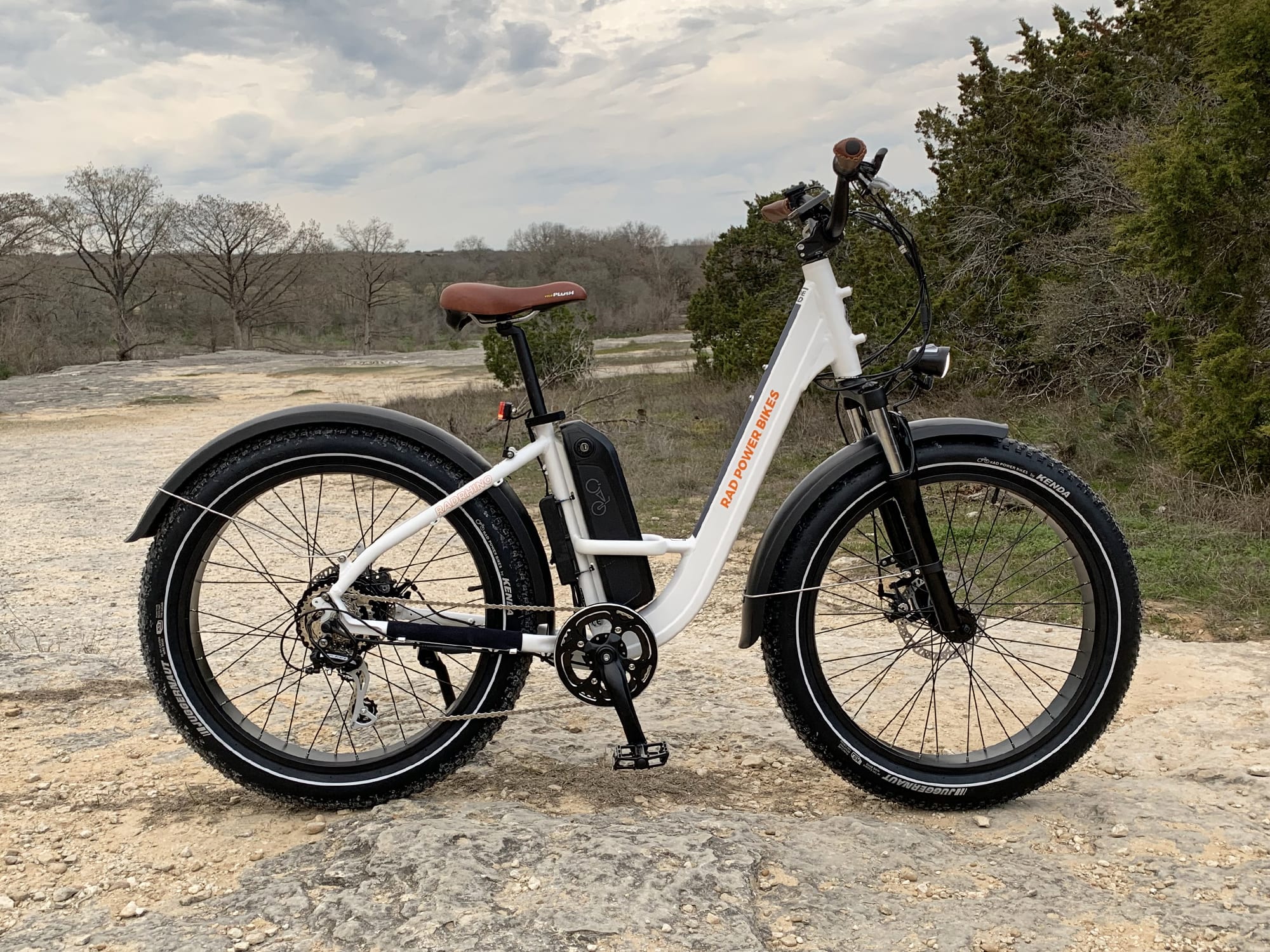
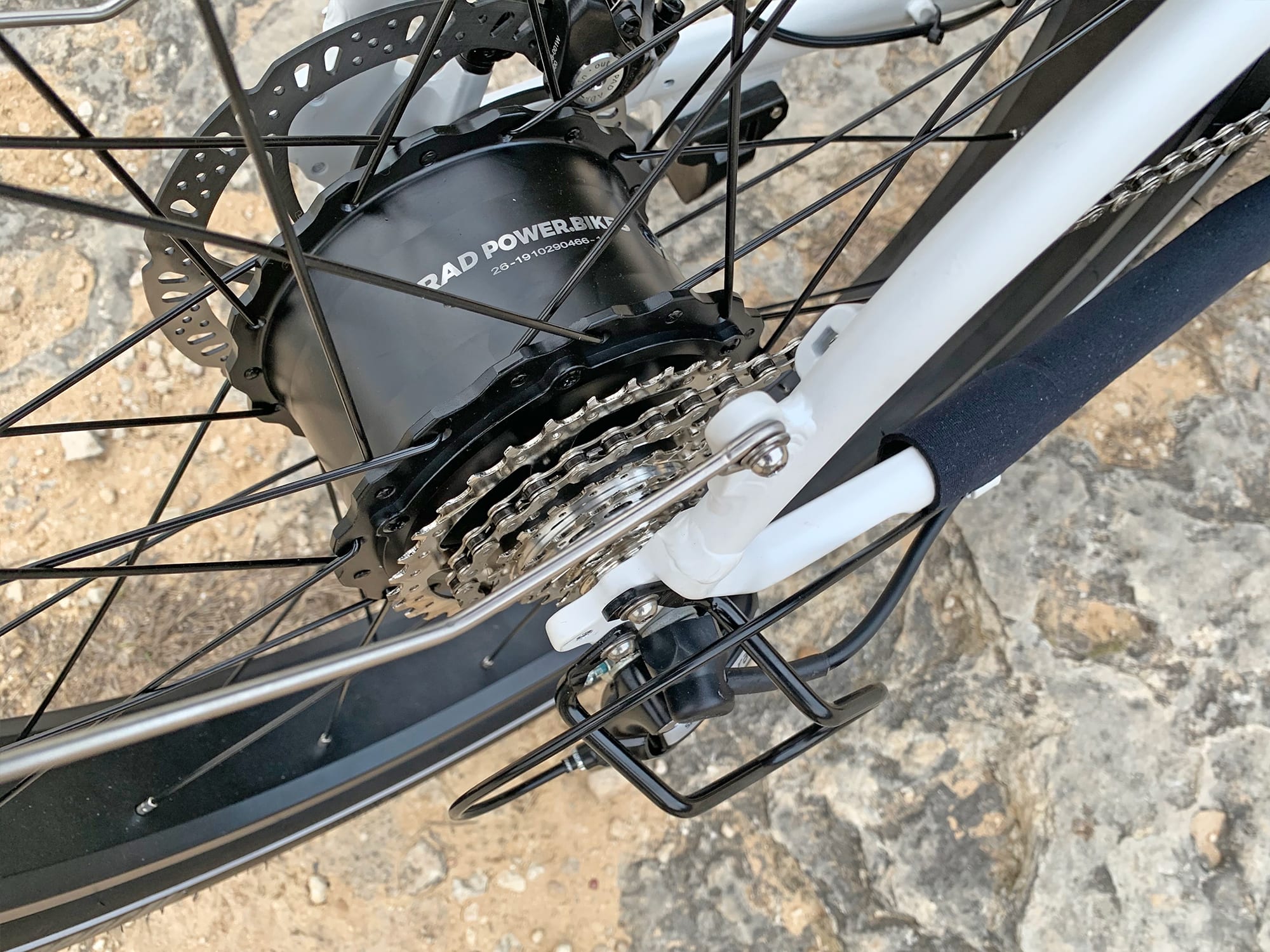




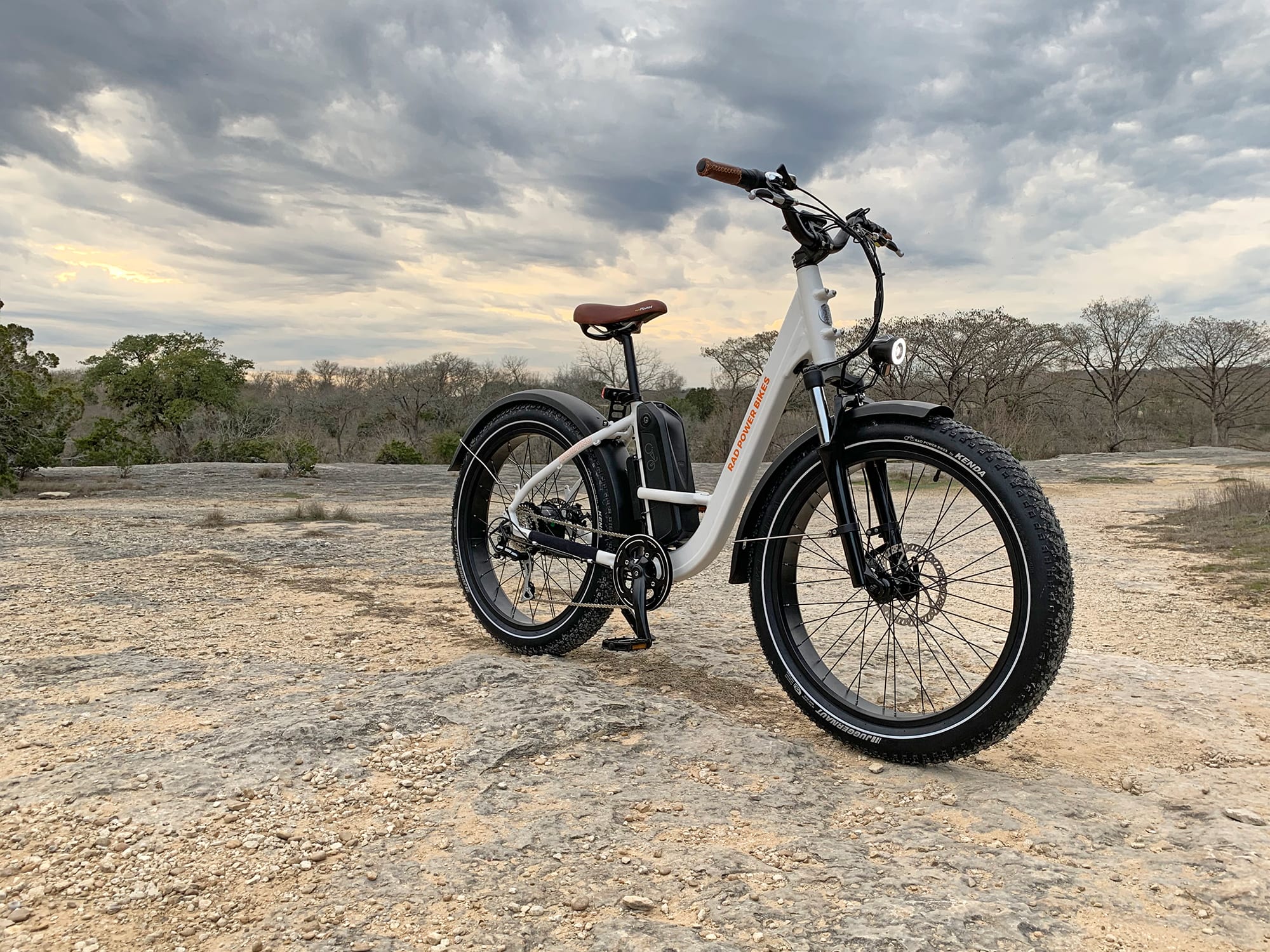
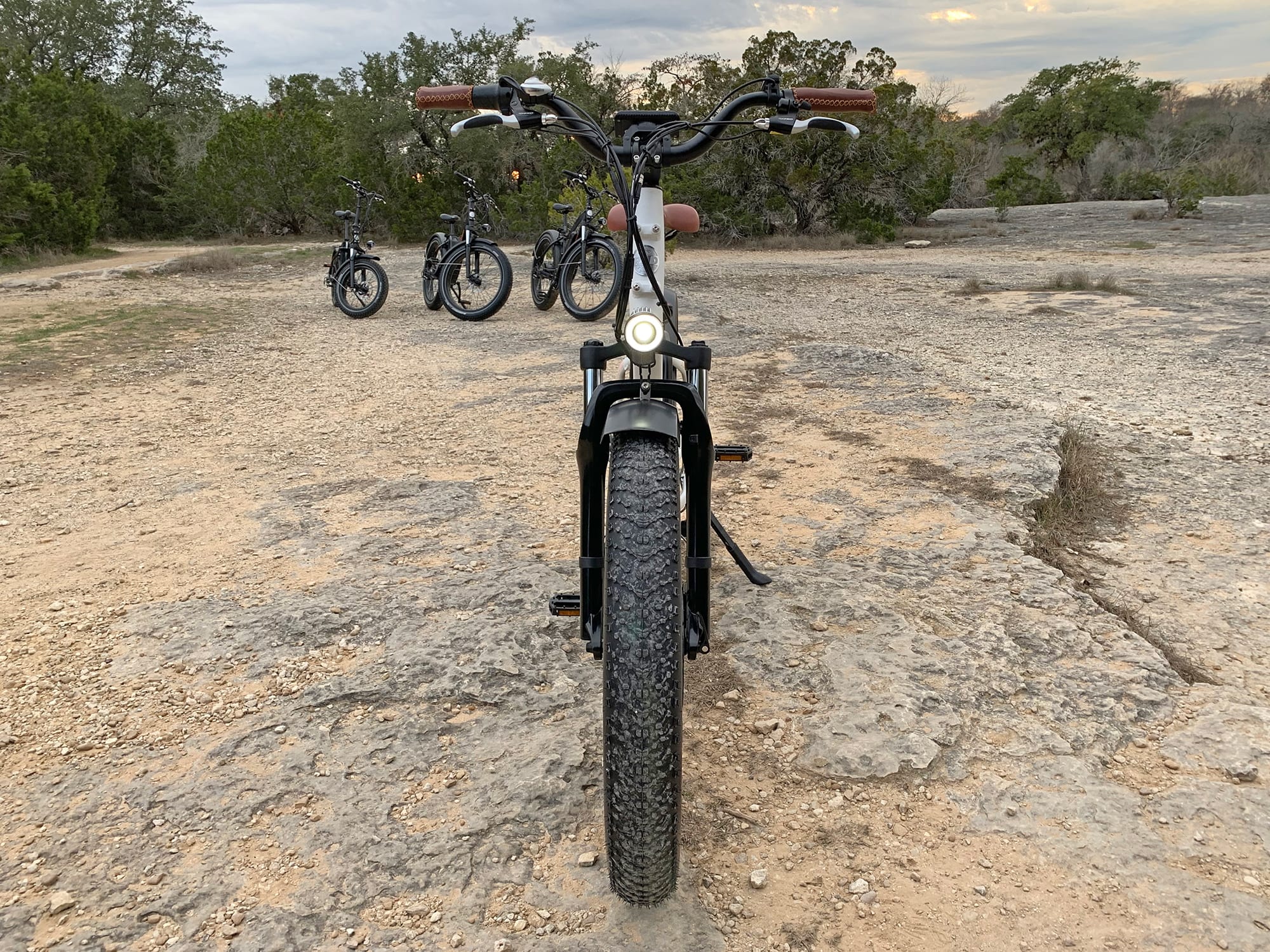
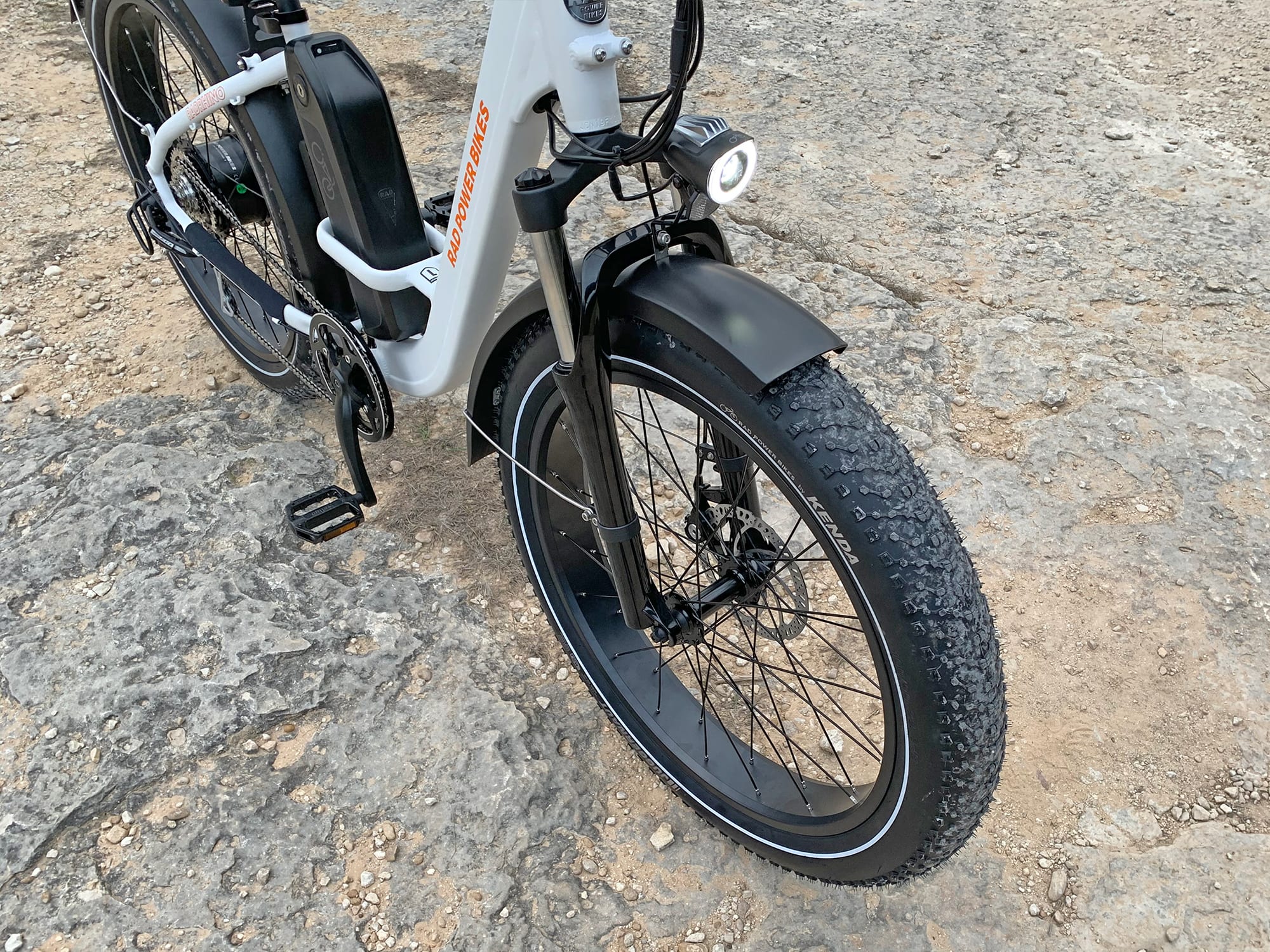
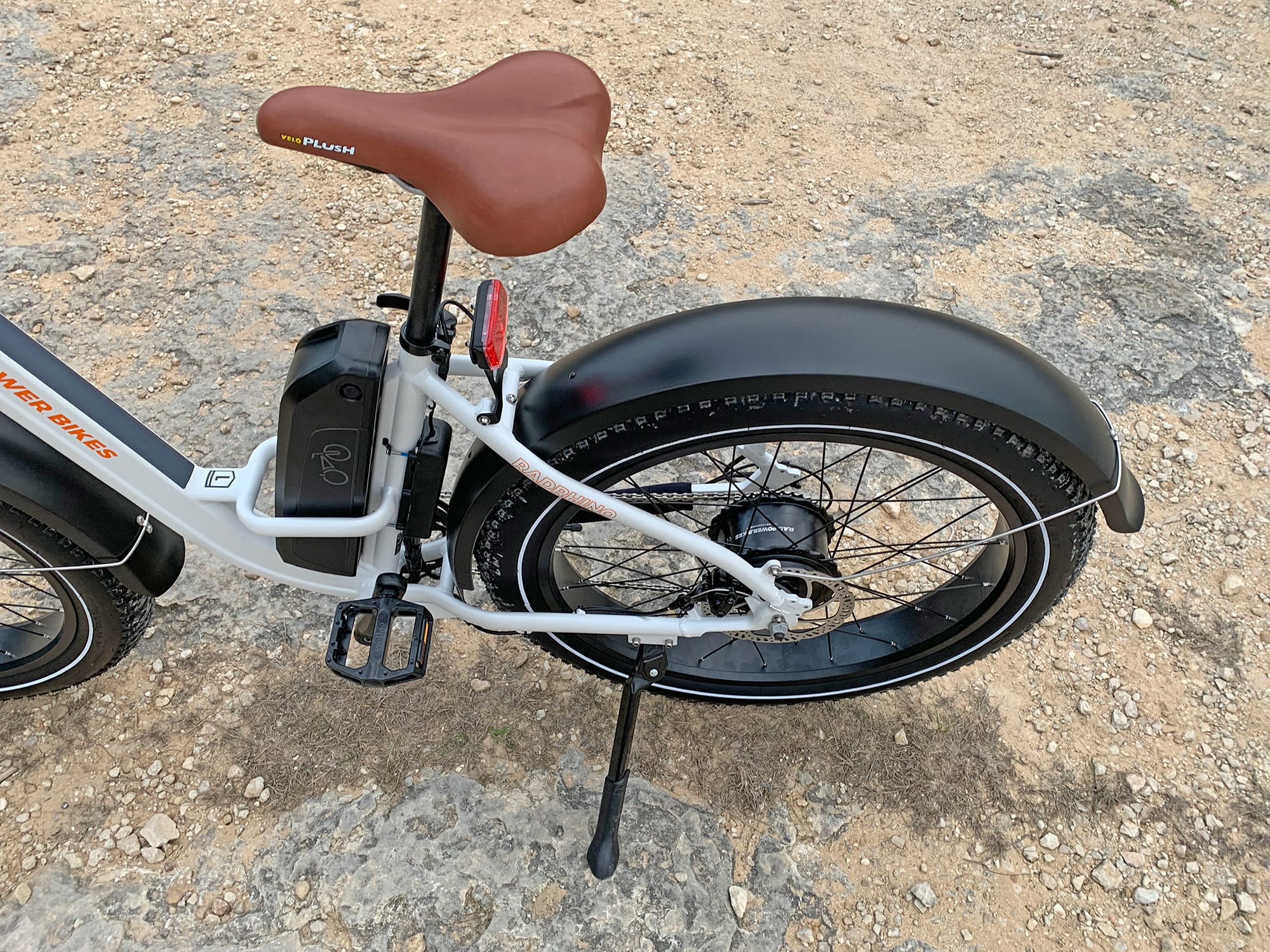
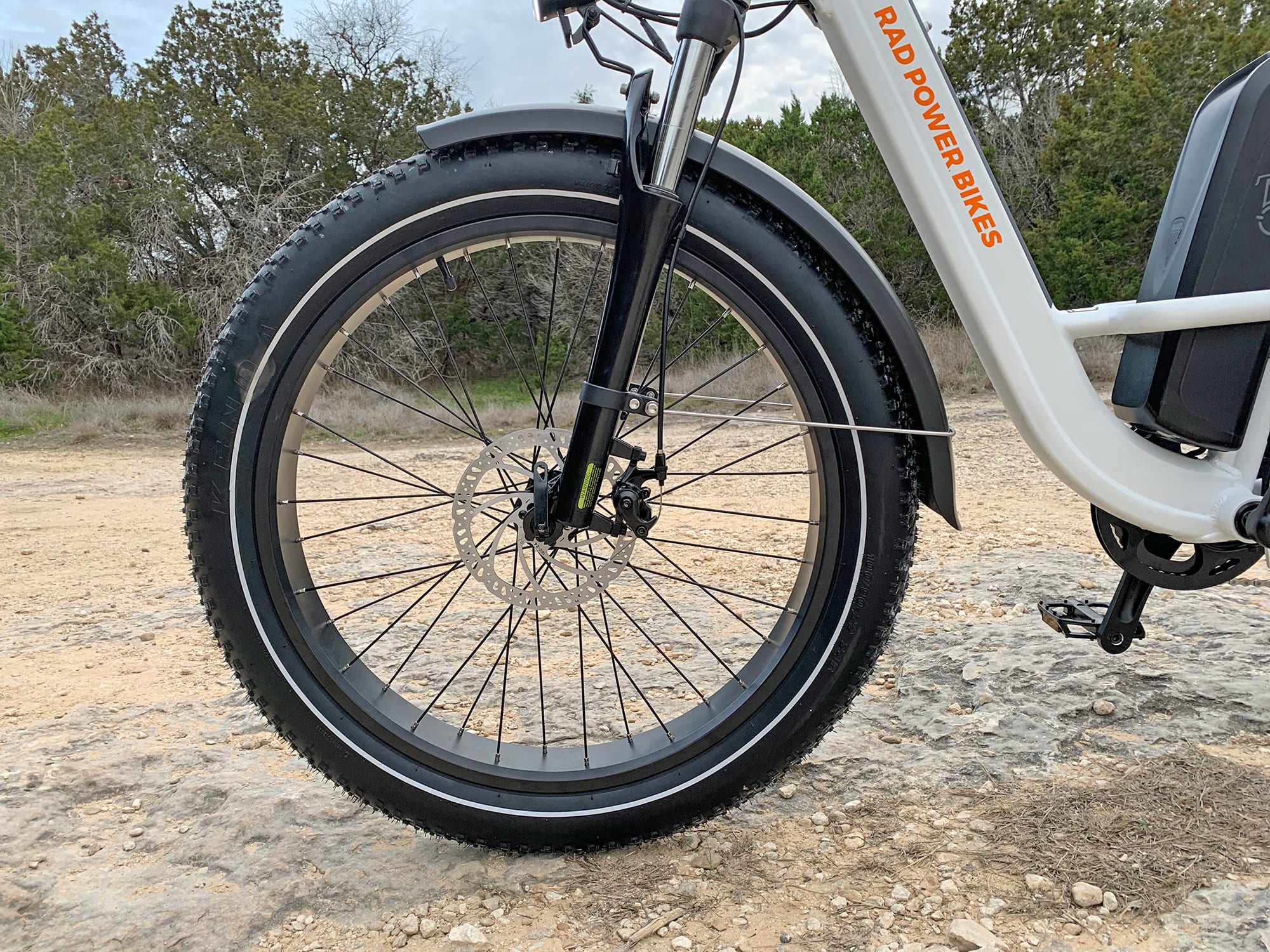

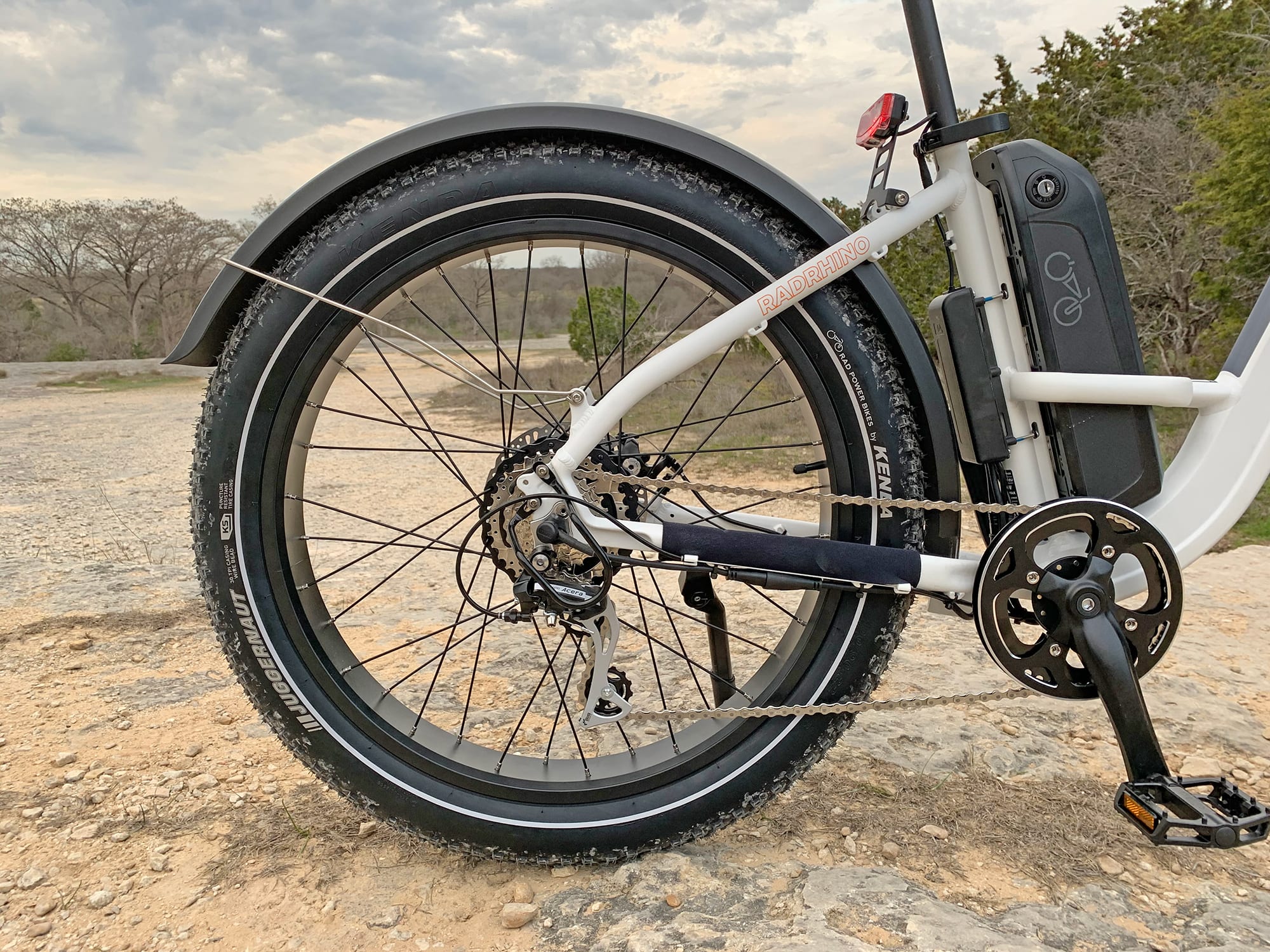
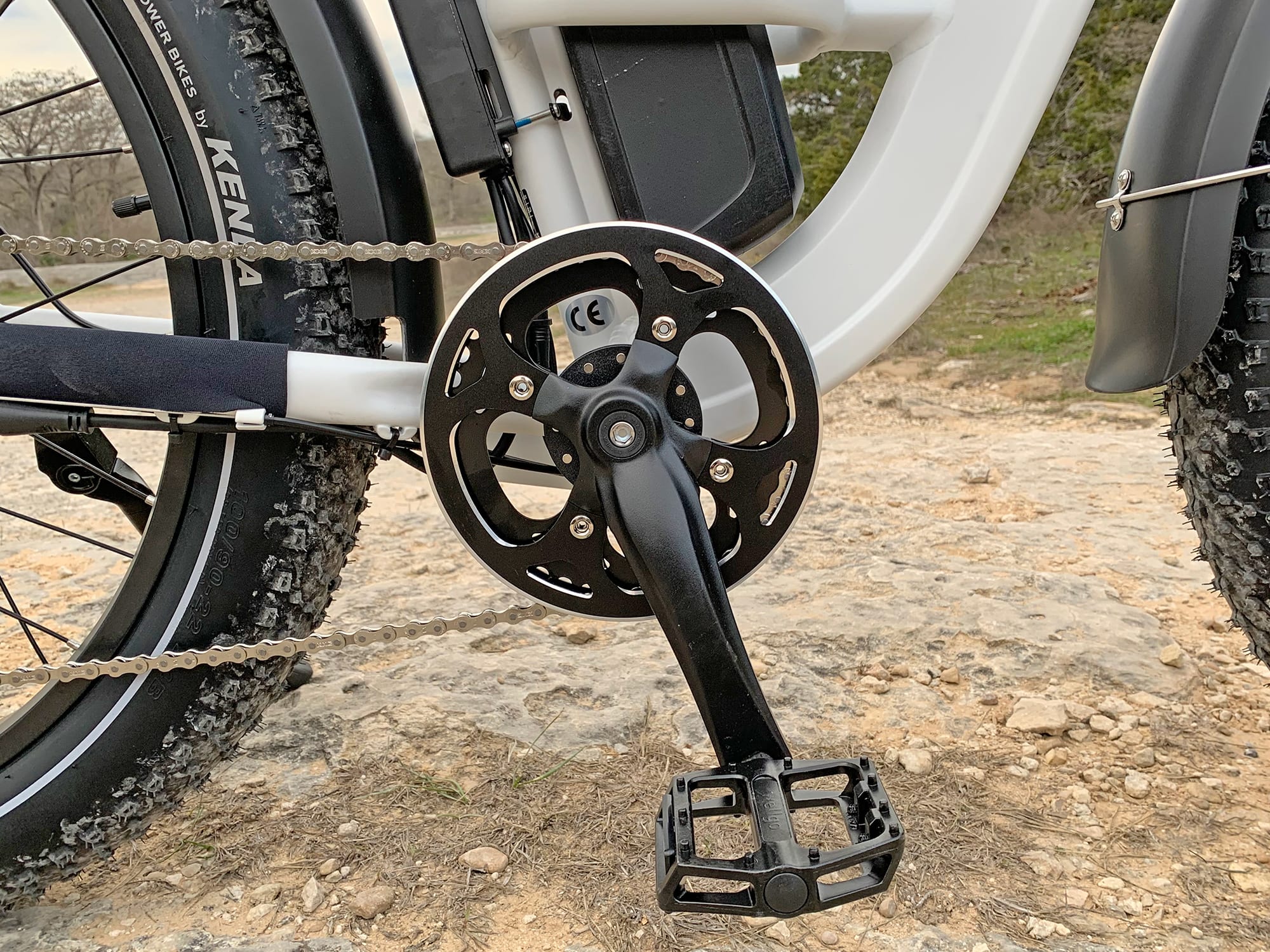
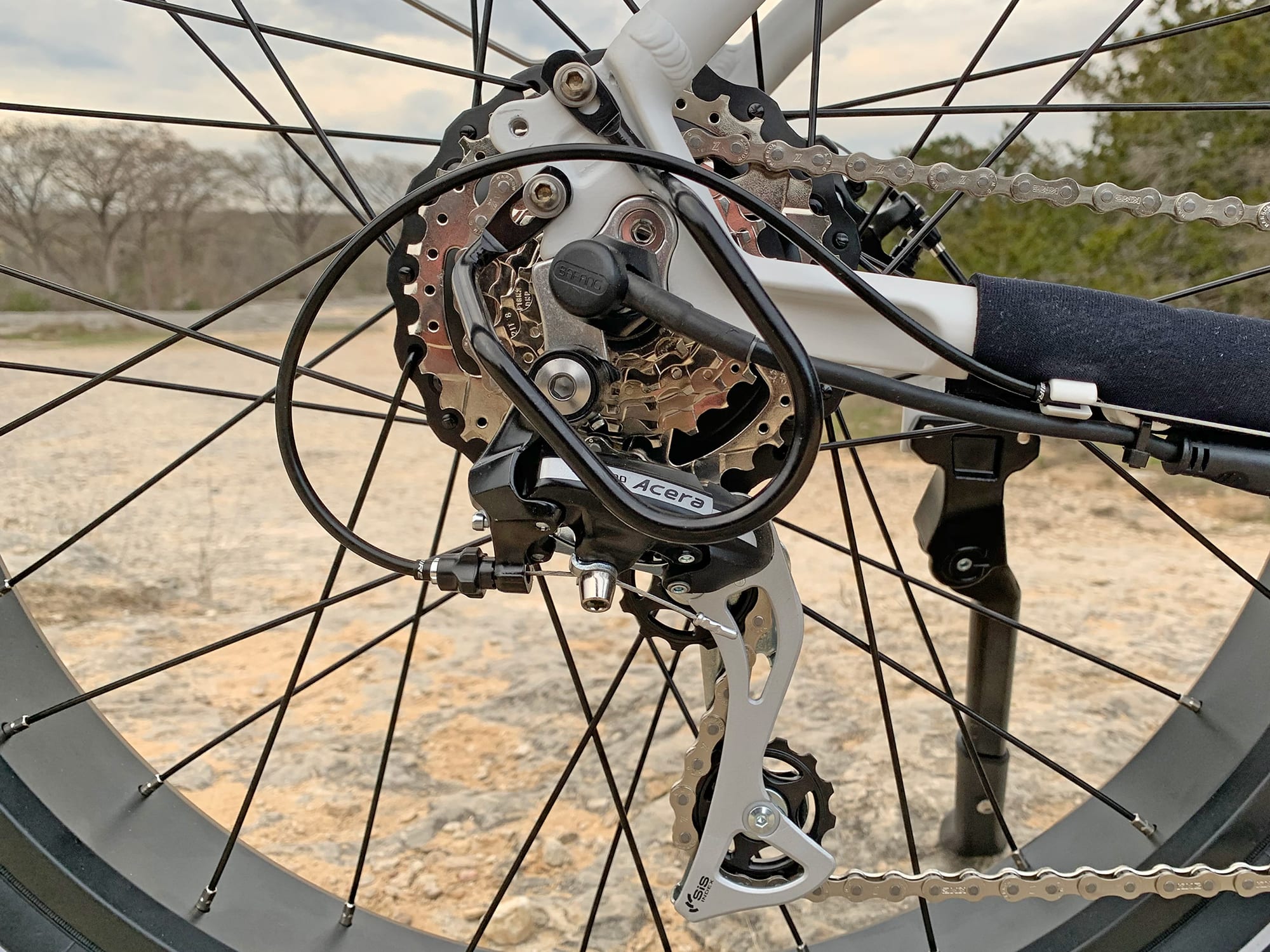
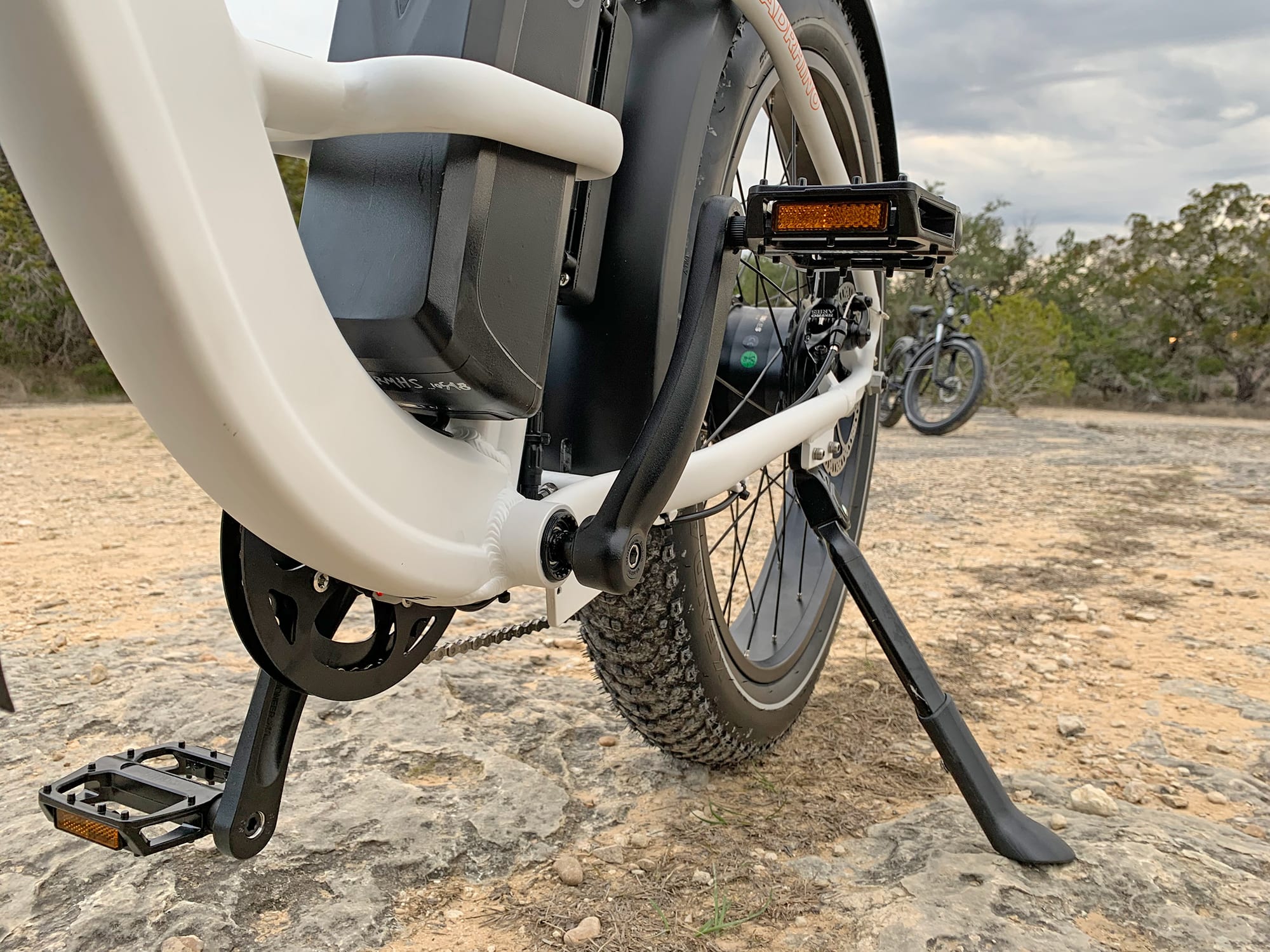
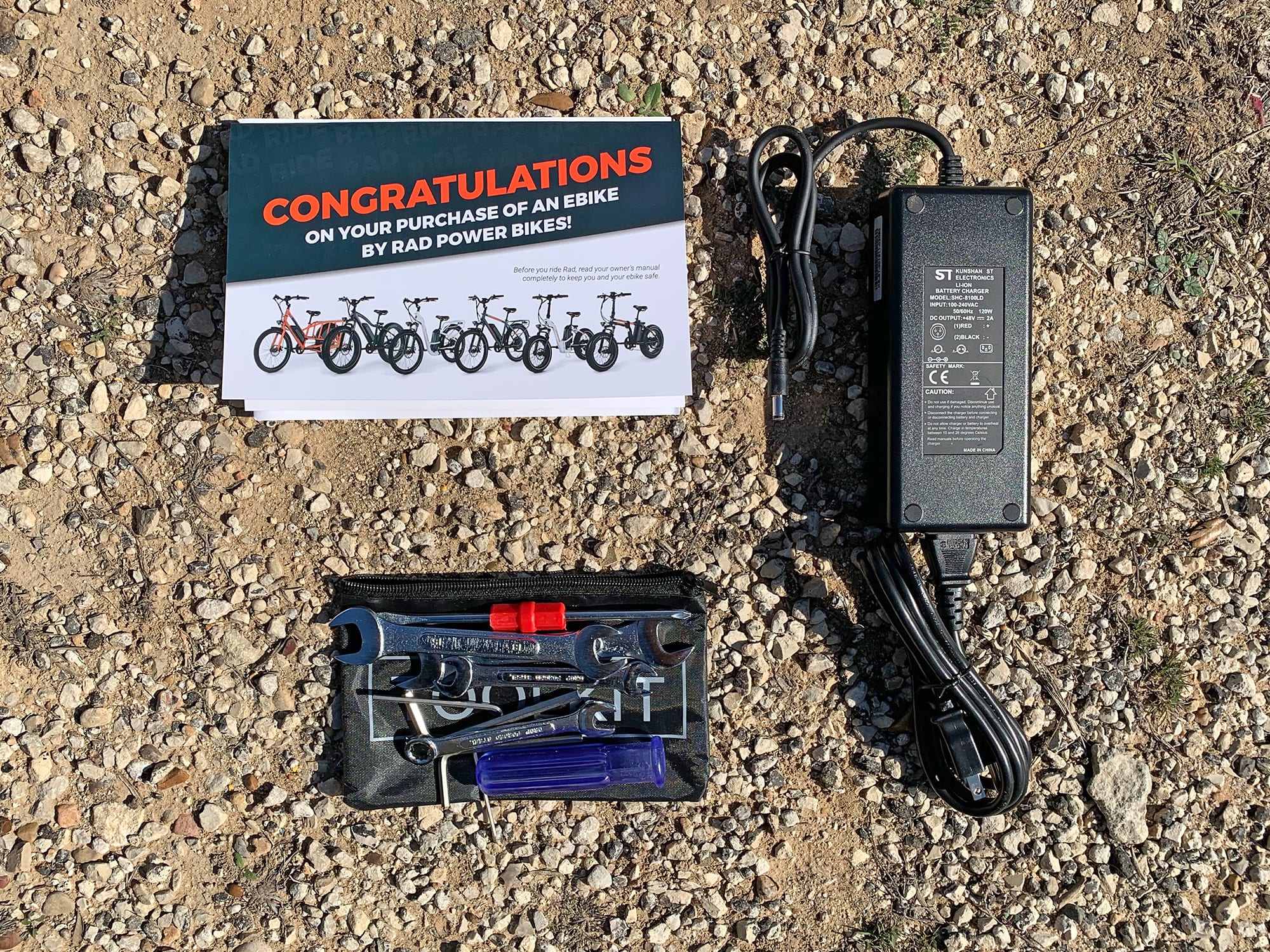
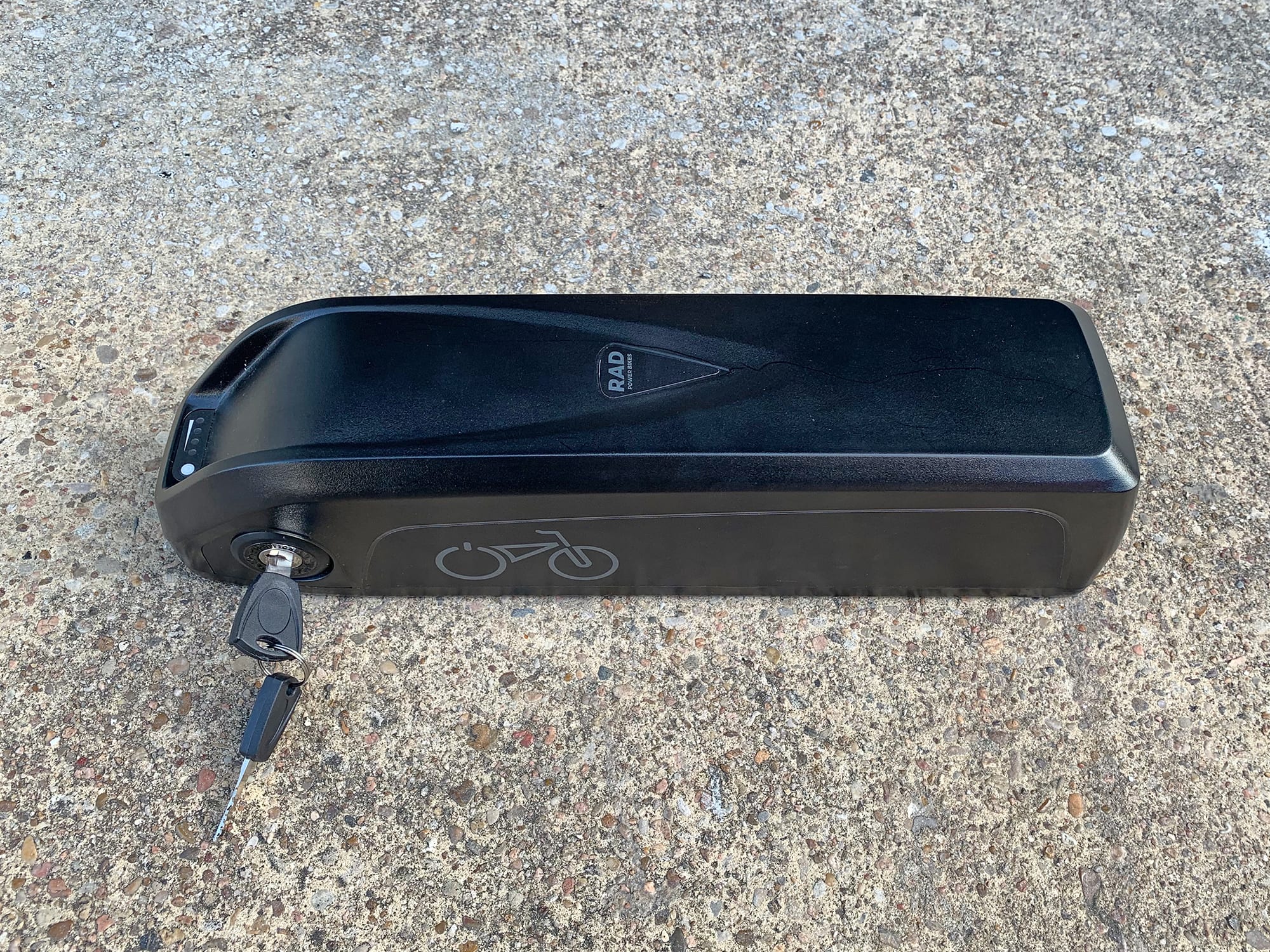


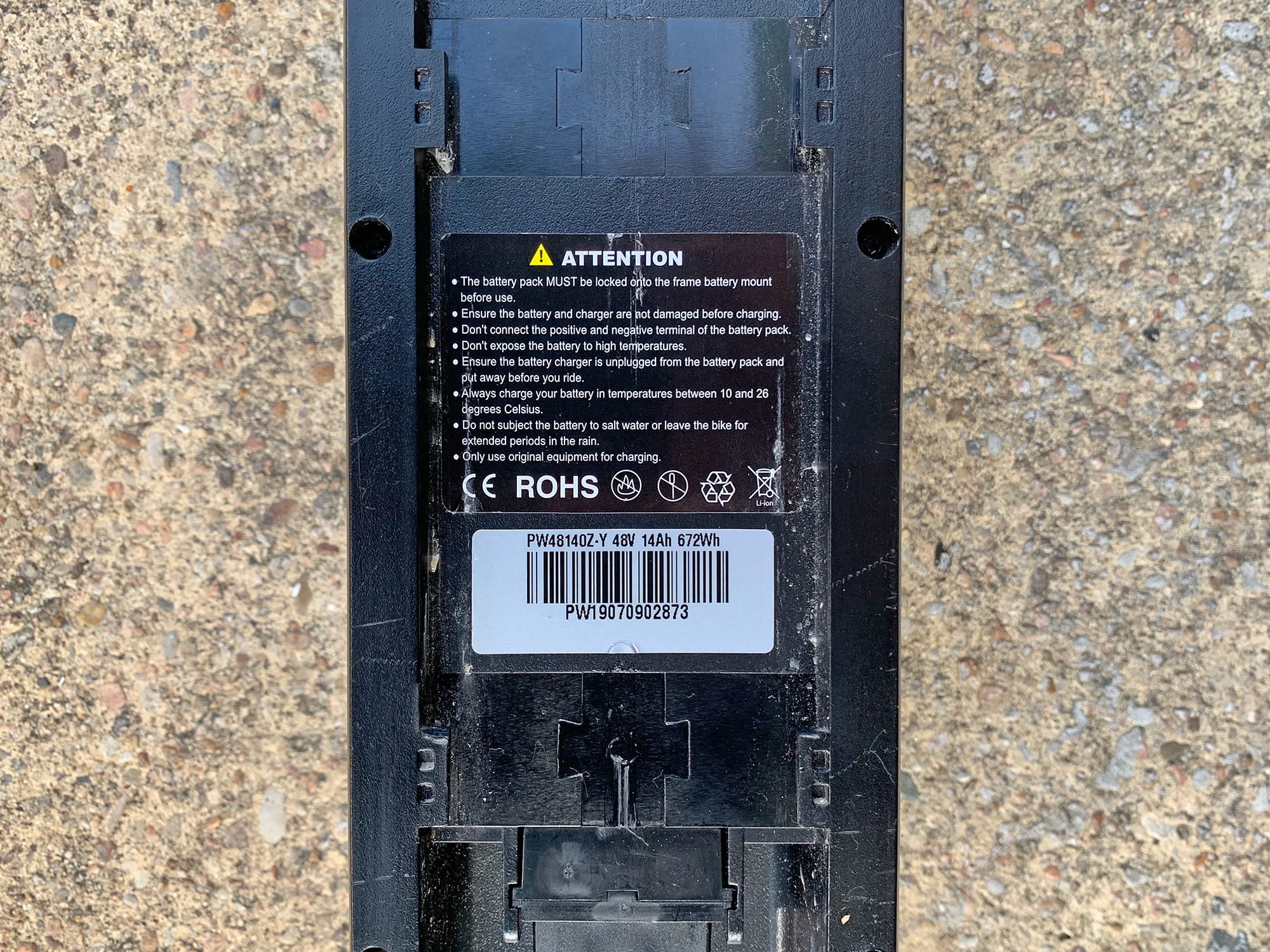

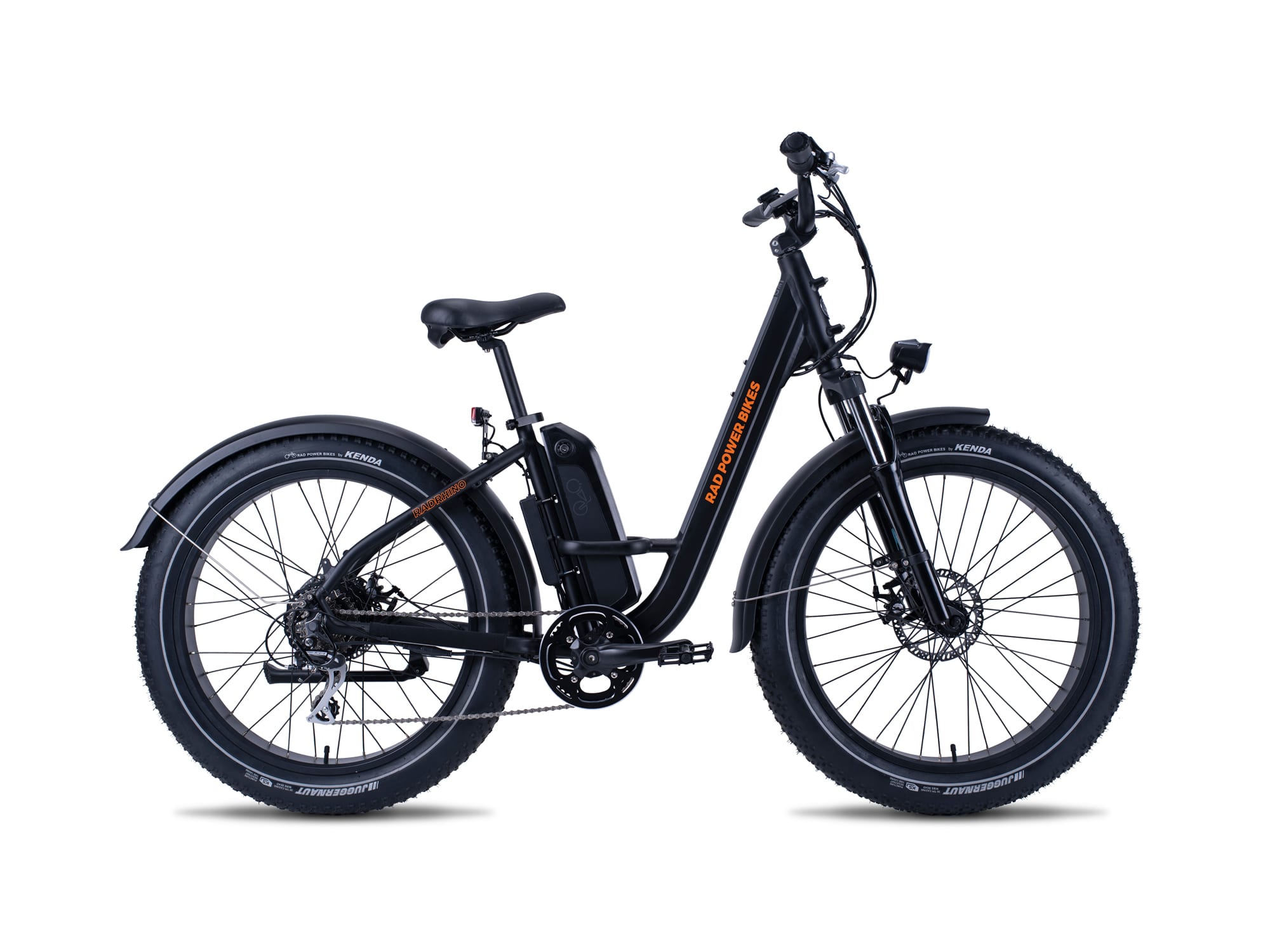
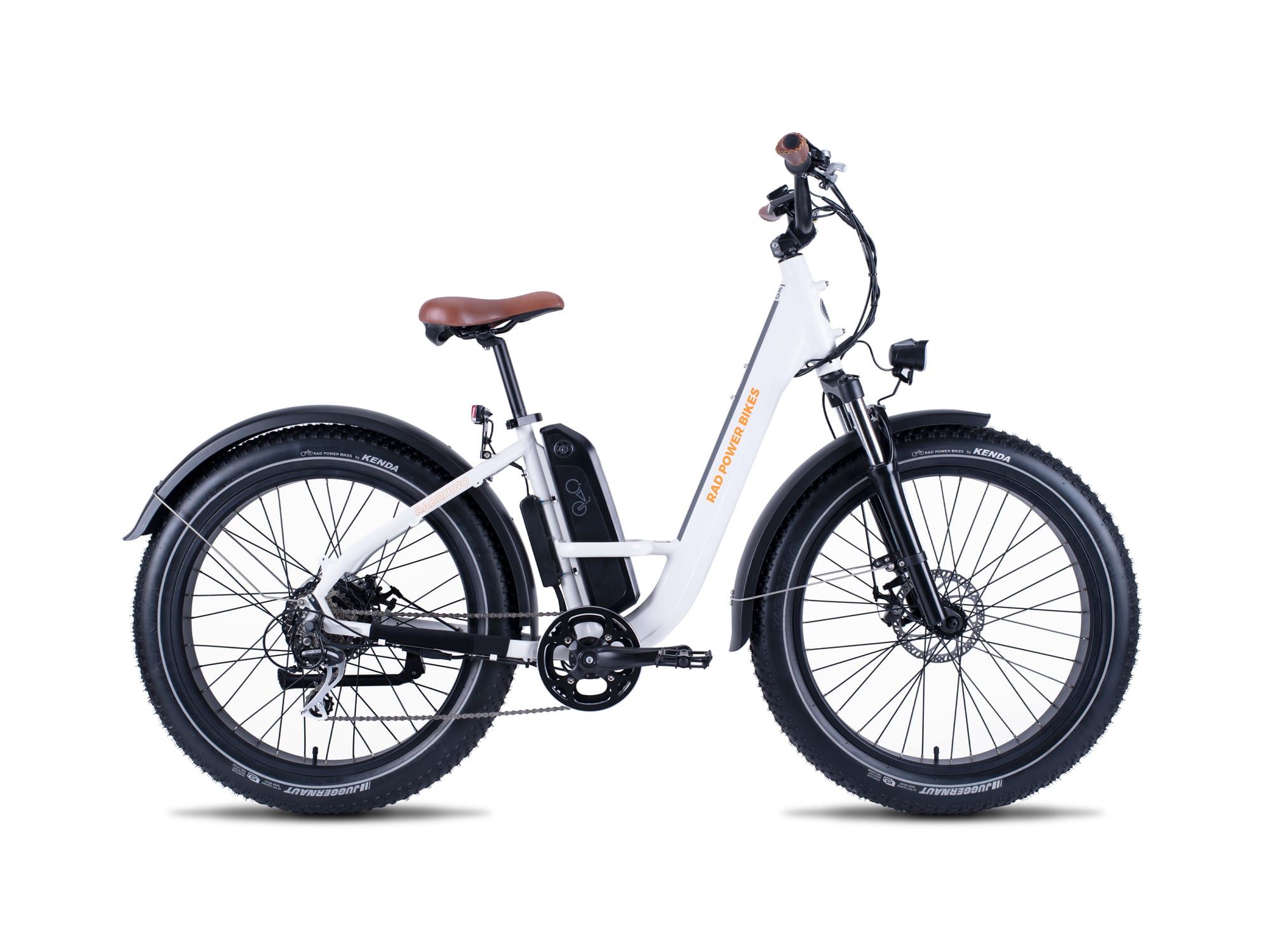



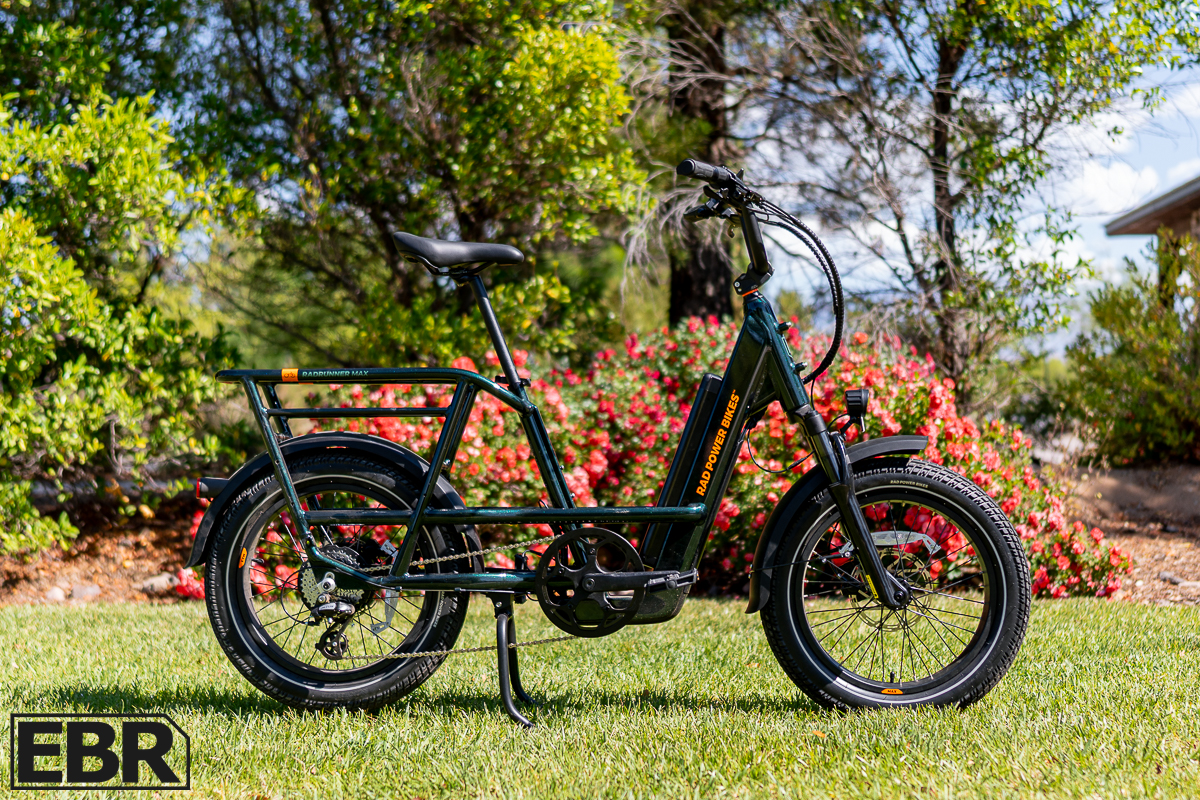
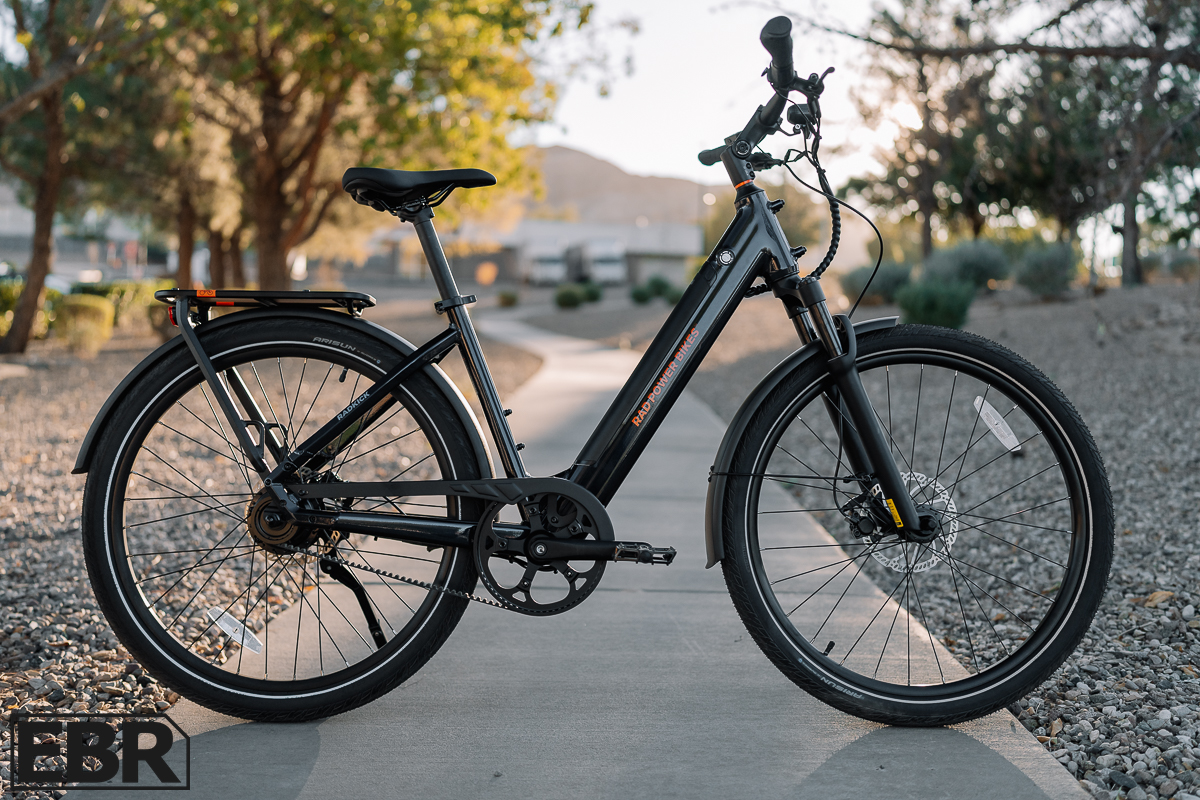
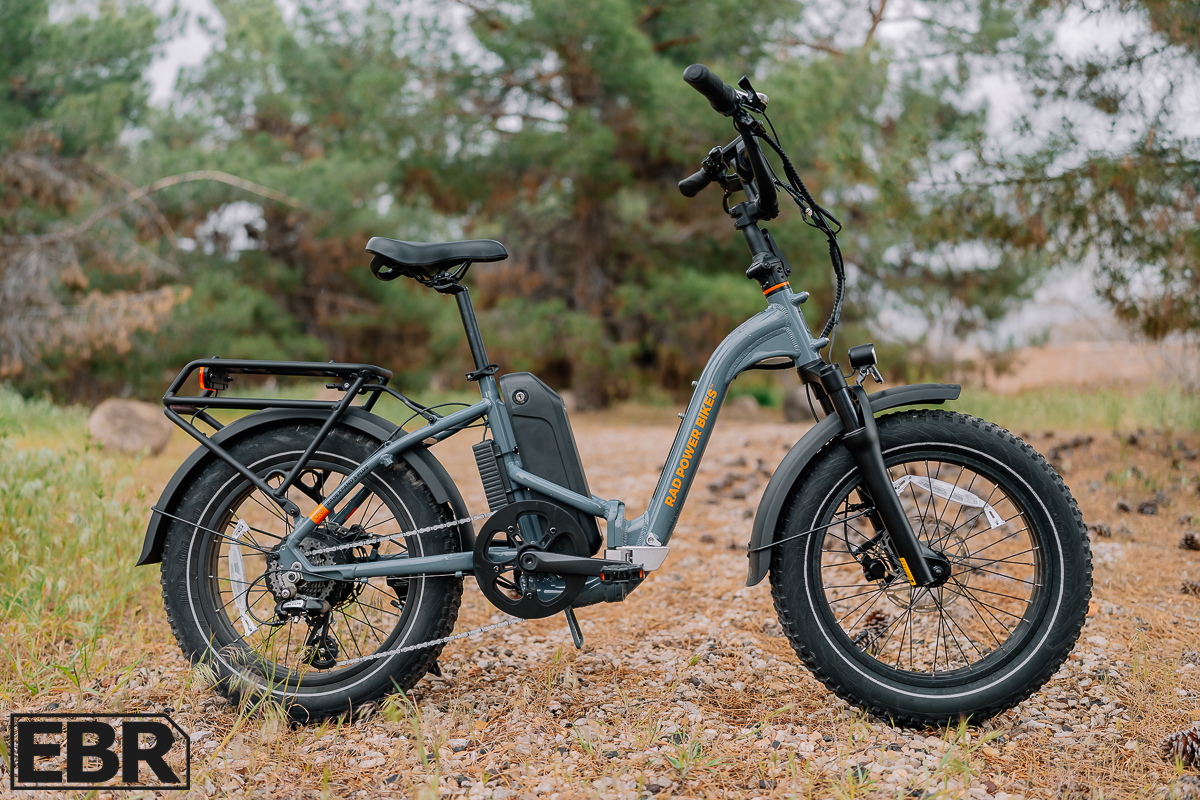
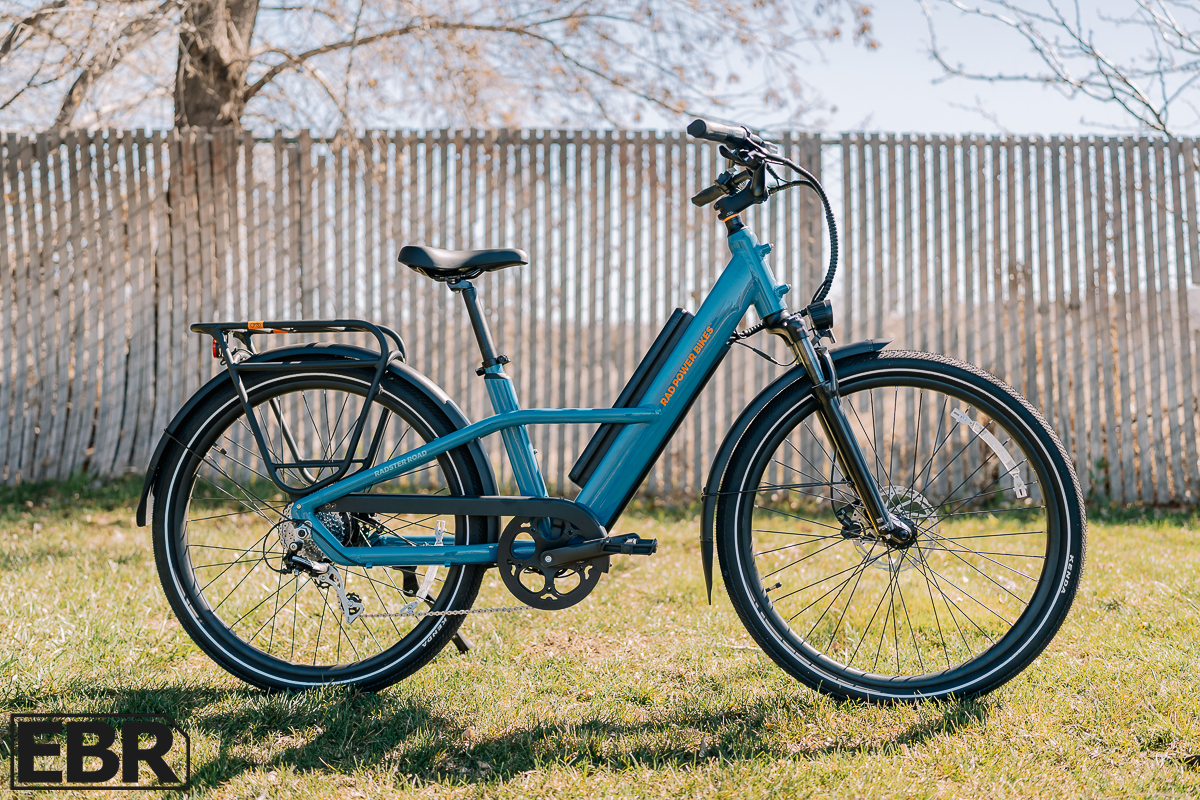
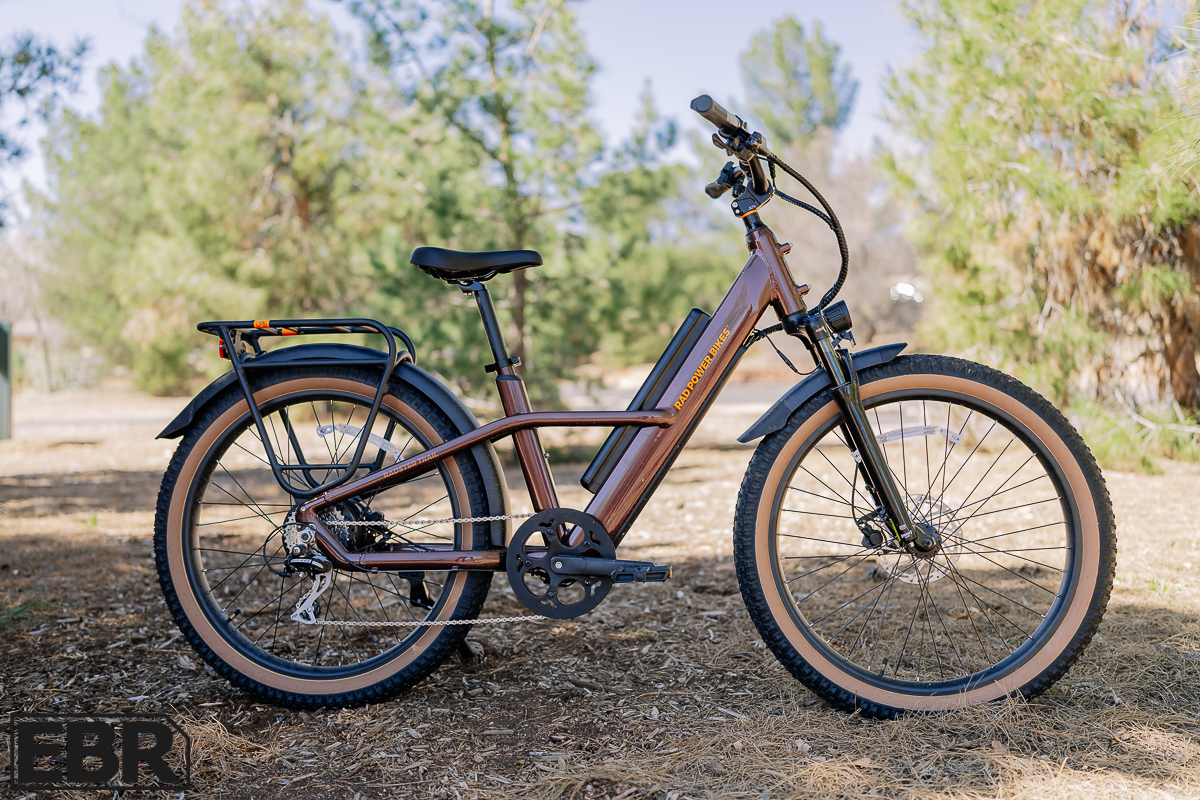
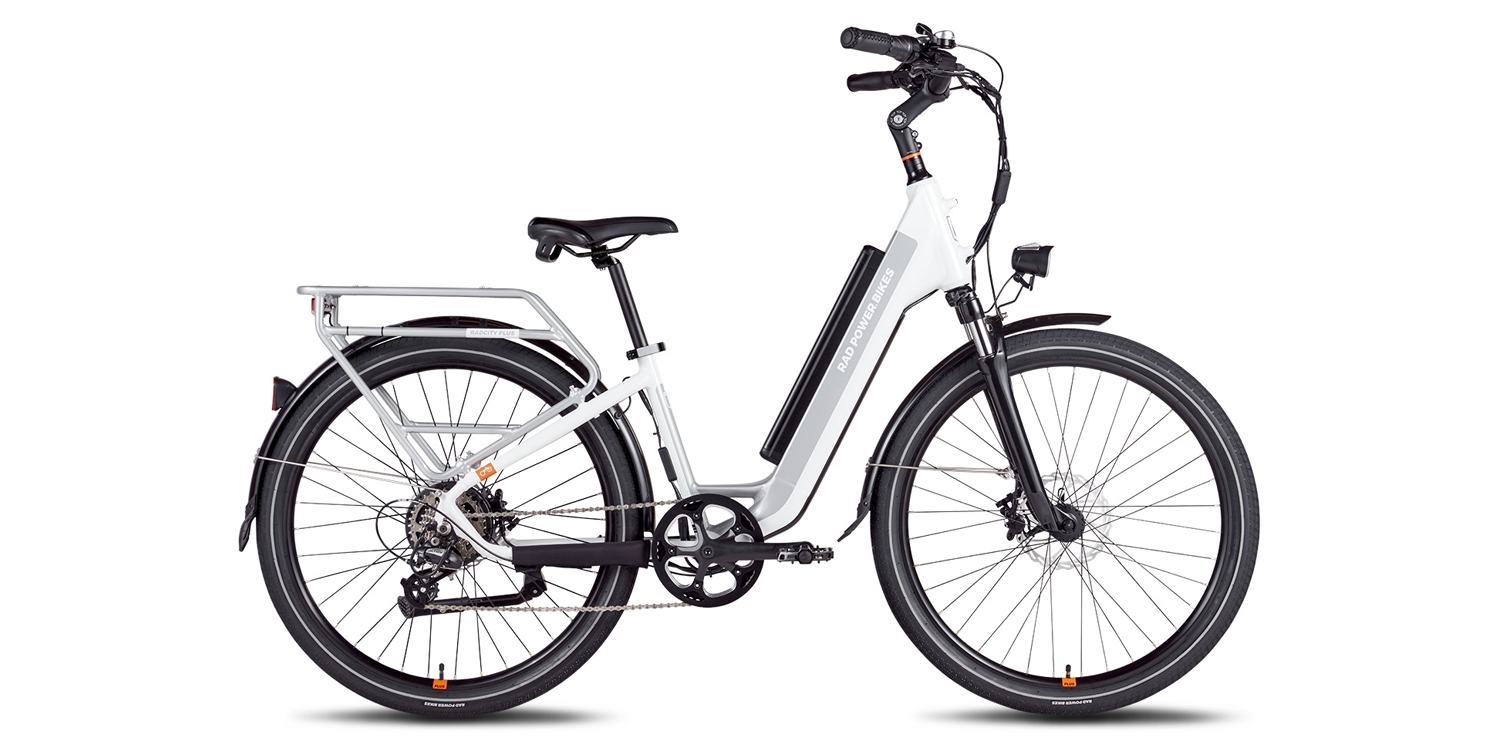
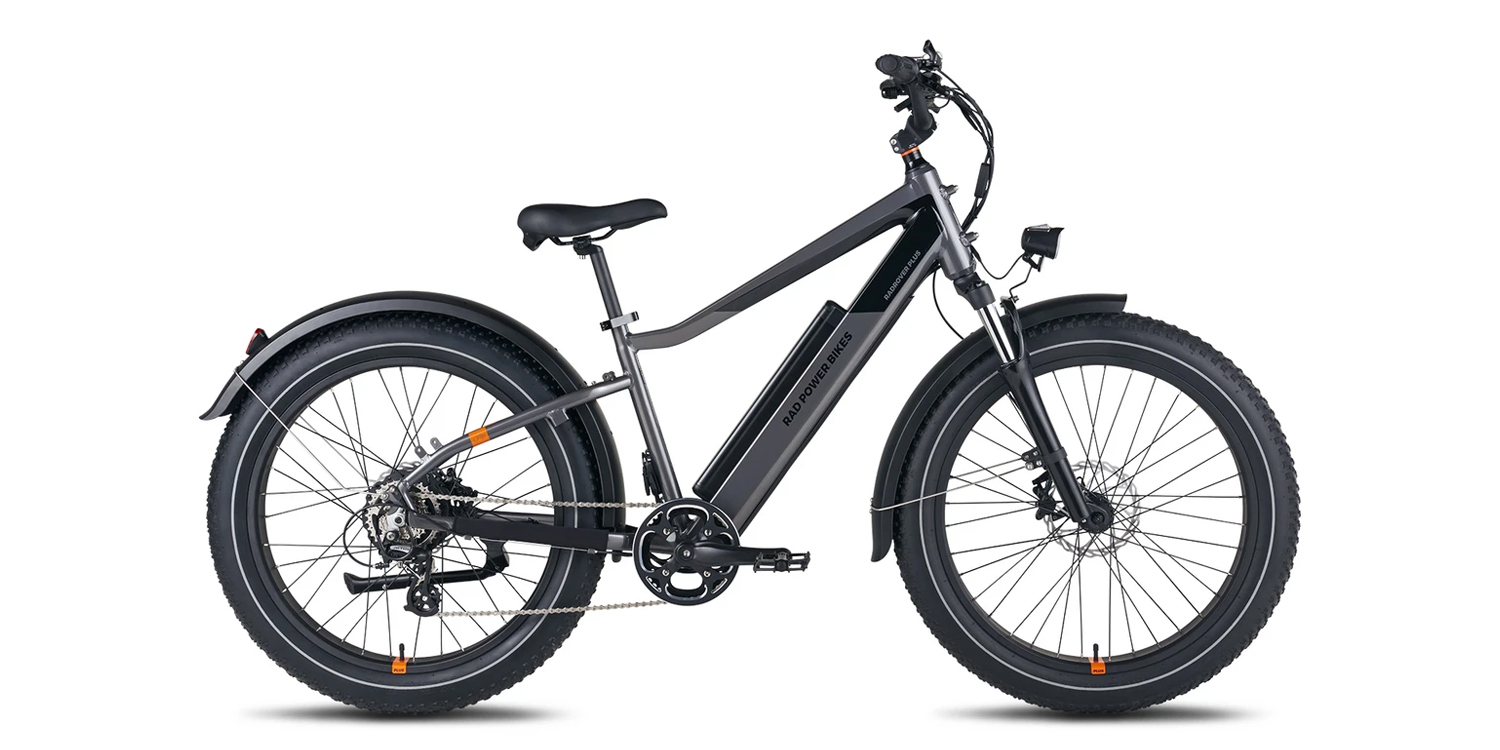
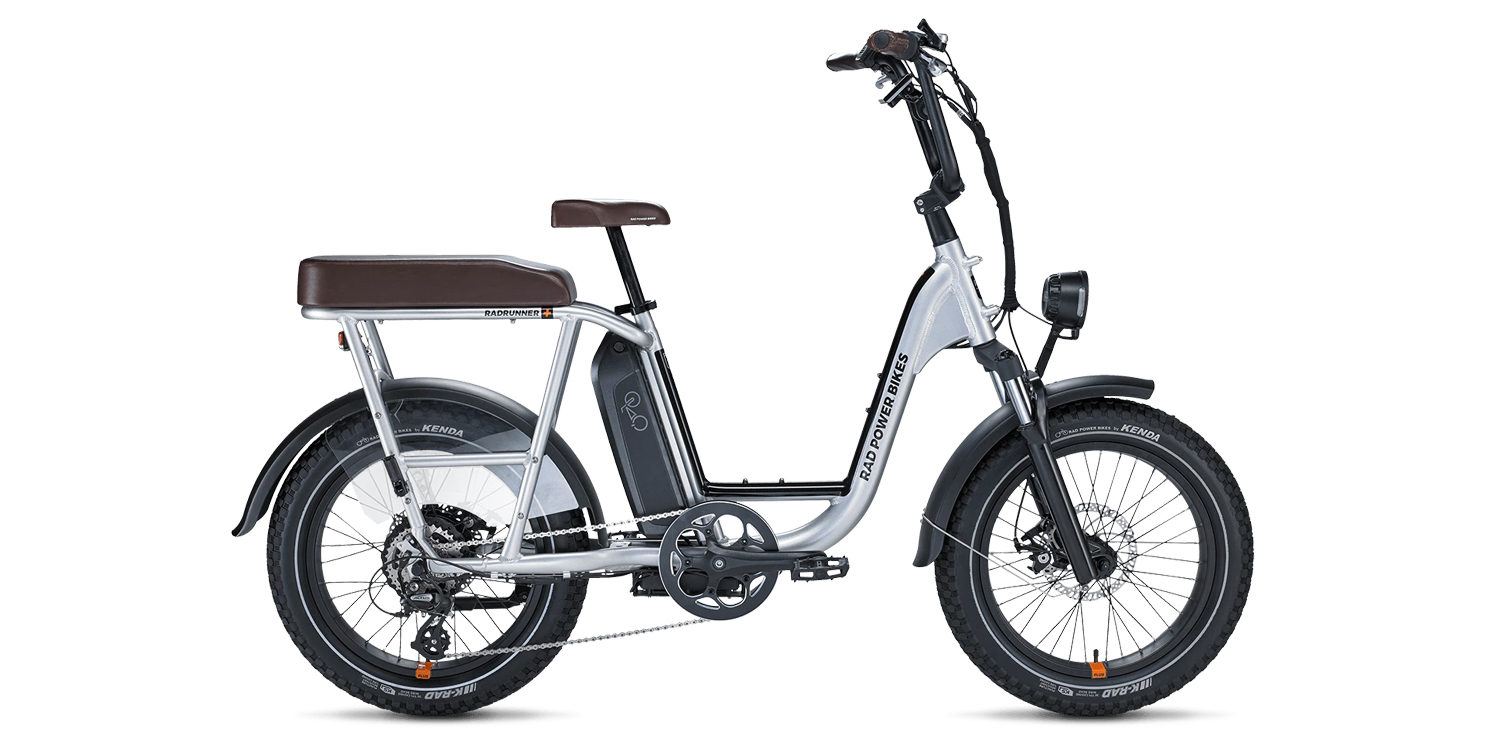
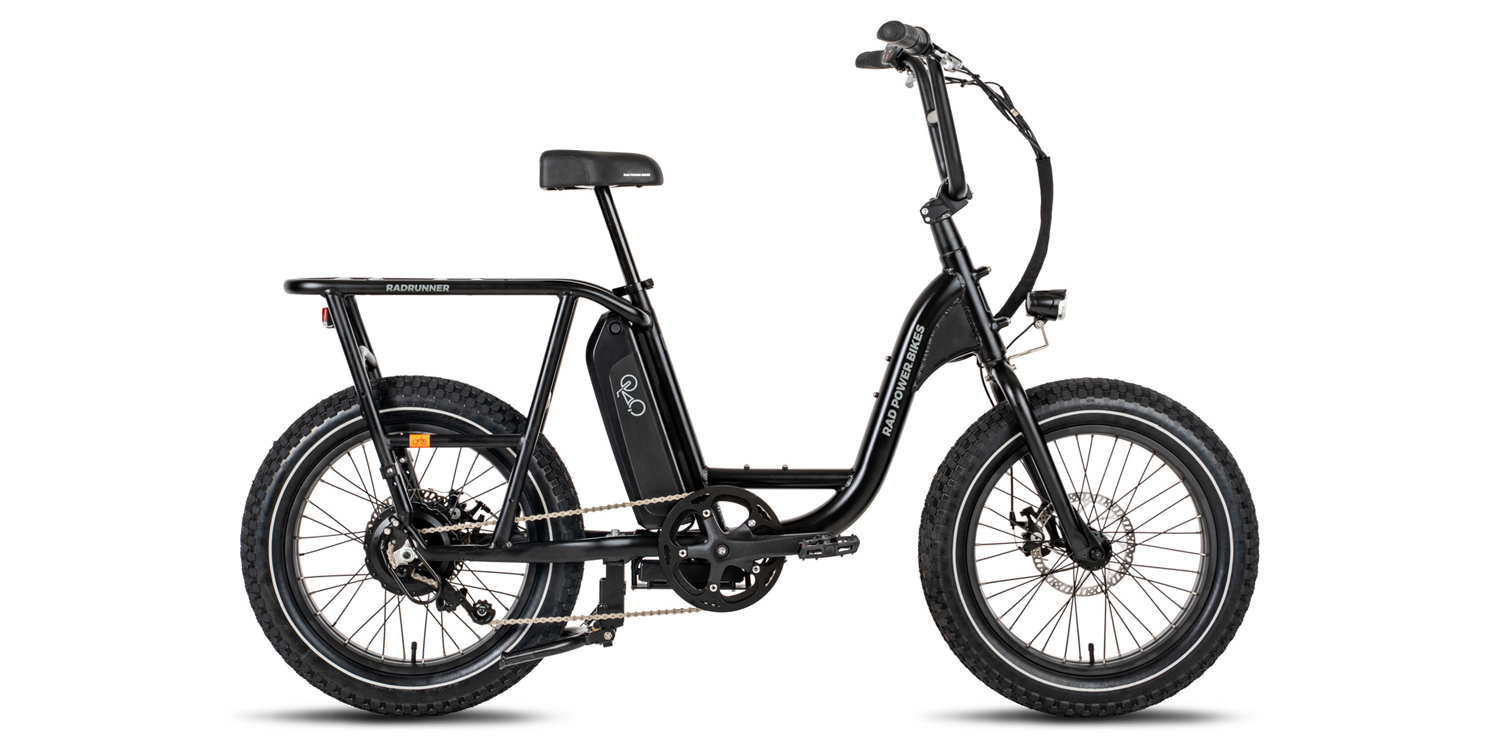
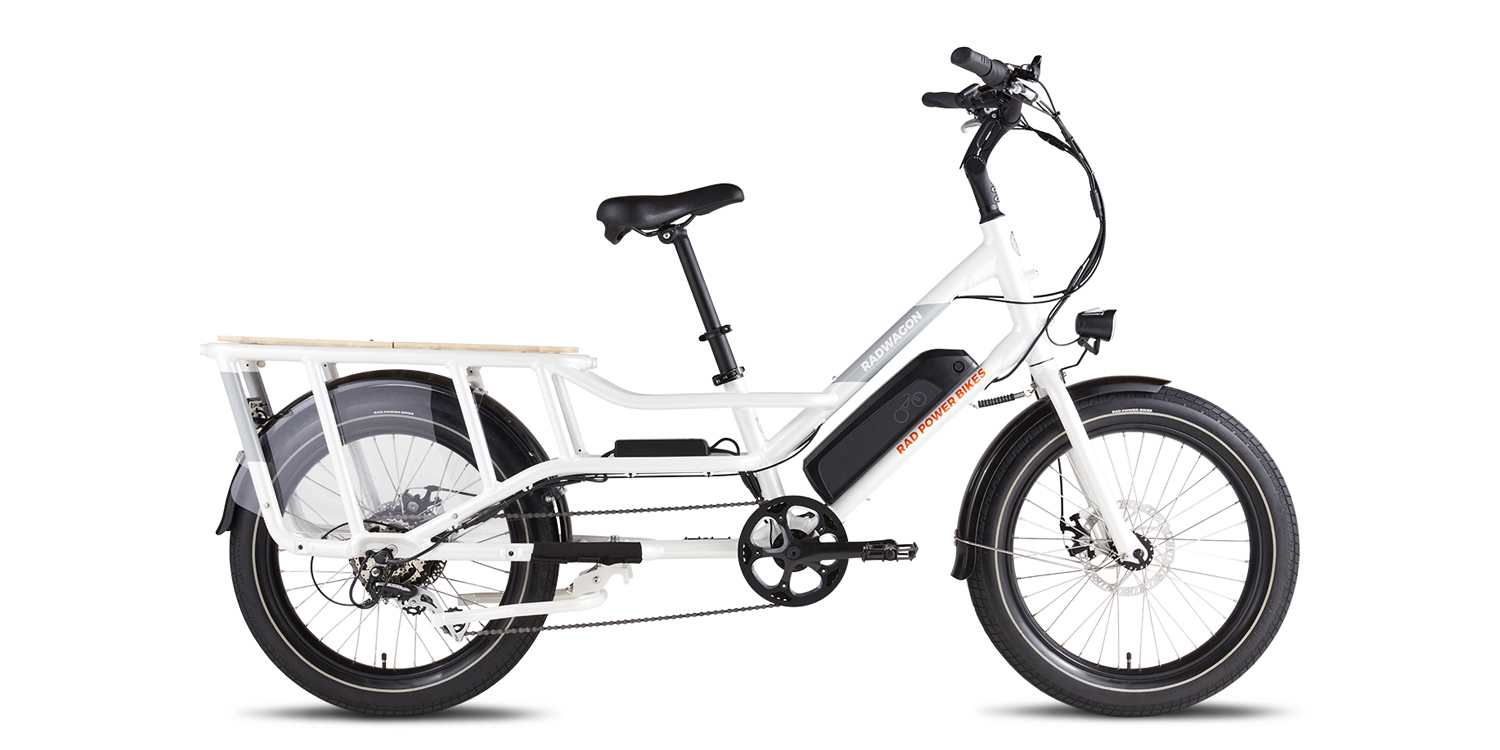

Reader Interactions